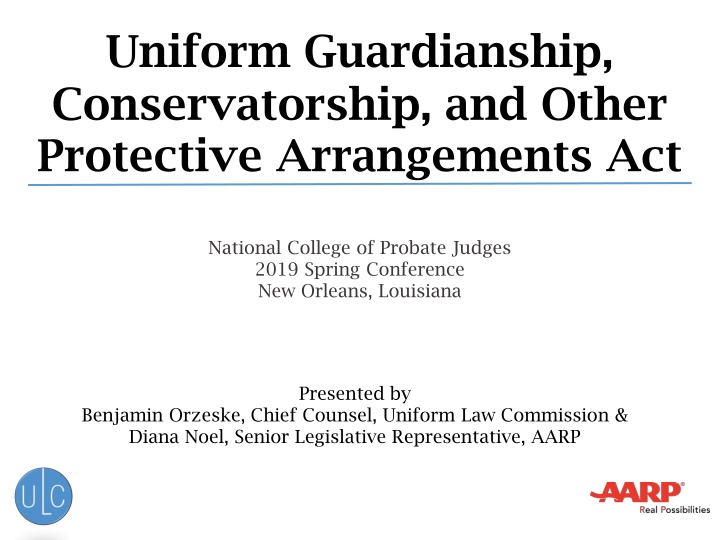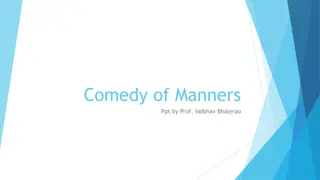
History of Uniform Guardianship Laws and UGCOPAA Development
Explore the evolution of uniform guardianship laws, from the 1969 Uniform Probate Code to the 2014 Uniform Guardianship, Conservatorship, and Other Protective Arrangements Act (UGCOPAA). Learn about the role of the Uniform Law Commission in drafting model legislation for state adoption and the collaborative efforts shaping modern protective arrangements.
Download Presentation

Please find below an Image/Link to download the presentation.
The content on the website is provided AS IS for your information and personal use only. It may not be sold, licensed, or shared on other websites without obtaining consent from the author. If you encounter any issues during the download, it is possible that the publisher has removed the file from their server.
You are allowed to download the files provided on this website for personal or commercial use, subject to the condition that they are used lawfully. All files are the property of their respective owners.
The content on the website is provided AS IS for your information and personal use only. It may not be sold, licensed, or shared on other websites without obtaining consent from the author.
E N D
Presentation Transcript
Uniform Guardianship, Conservatorship, and Other Protective Arrangements Act National College of Probate Judges 2019 Spring Conference New Orleans, Louisiana Presented by Benjamin Orzeske, Chief Counsel, Uniform Law Commission & Diana Noel, Senior Legislative Representative, AARP
What is the ULC? Uniform Law Commission (ULC) Non-profit organization formed in 1892 Commissioners are volunteer attorneys appointed by the states ULC drafts model state legislation on topics where uniformity among the states is desirable Legislative staff based in Chicago headquarters www.uniformlaws.org
49-Year History of Law Reform 1969: Uniform Probate Code (Article V on Protection of Persons Under Disability and their Property) 1979: Uniform Durable Power of Attorney Act 1982: Uniform Guardianship & Protective Proceedings Act (Introduces limited guardianships) 1997: Revised UGPPA (More protective of an individual s legal rights; least restrictive alternative; court visitor; must take person s views into account) 2006: Uniform Power of Attorney Act (Greater protection against financial abuse; encourages wider acceptance)
The Road to UGCOPAA October 2011: National Guardianship Network Third National Guardianship Summit
The Road to UGCOPAA Spring 2012 2012-2013 3rdNational Guardianship Summit Standards and Recommendations ABA Commission on Law & Aging reviews recommendations and determines which can be implemented by statute Fall 2013 Fall 2014 Professors David English and Linda Whitton propose new revision Goal: to implement the Summit s standards and recommendations ULC President appoints new drafting committee Chair: Professor David English
UGCOPAA Drafting Committee Prof. David English, Chair Prof. Nina Kohn, Reporter Uniform Law Commissioners from 10 States
New Law, New Name Uniform Guardianship and Protective Proceedings Act ( UGPPA ) 1997 Uniform Guardianship, Conservatorship, and Other Protective Arrangements Act ( UGCOPAA ) 2017
UGCOPAA Terminology Guardian means a person appointed by the court to make decisions with respect to the personal affairs of an individual. Conservator means a person appointed by a court to make decisions with respect to the property or financial affairs of an individual. Less restrictive alternative means an approach to meeting an individual s needs which restricts fewer rights of the individual than would the appointment of a guardian or conservator. The term includes supported decision making, appropriate technological assistance, appointment of a representative payee, and appointment of an agent by the individual, including appointment under a [power of attorney].
Why Guardianship Reform Recent articles have spotlighted many holes in state systems that failed vulnerable adults and exposed them to abuse and exploitation People are living longer and there will be more people in a system that it s not prepared to handle Most states haven t had a major revision of guardianship laws in over 20 years
Political Landscape Typically a bi-partisan issue Issue isn t hot UNLESS there s a crisis or tragedy Broad issue and could be a very long process No one-size-fits-all solution Lack of data Policy wonks aren t necessarily on-the- ground/frontline, workers and vice versa
Common Issues Across States Caregiving Shortage of Guardians Public Guardianship Abuse/Financial Exploitation Accountability and Court Monitoring Individual Rights Alternatives to Guardianship Lack of Good and Consistent Data
Reform Trends Individuals, their family and friends are speaking up! Person-centered approach Alternatives to guardianship Standards and training for ALL guardians Increase in education and outreach Monitoring reforms to prevent abuse/exploitation More collaboration/taskforces/ multidisciplinary teams (ex. WINGS) State courts are taking on a more active role
Person-Centered Terminology Old: Ward Alleged incapacitated person Incapacitated person New: Adult/Minor Respondent Adult/Minor subject to guardianship/conservatorship
UGCOPAA: A Basic Overview Encourages individualized planning Requires least restrictive environment Increases court oversight and monitoring Focus on the Courts Outlines clear duties and responsibilities Prevents isolation Gets rid of bad actors Focus on the Guardian Protects legal rights Updates terminology Promotes independence Focus on the Individual
Seven Key Reforms 1. 2. 3. 4. 5. 6. 7. Expanded Procedural Rights Least-Restrictive Alternative Individual Guardianship Plans Enhanced Monitoring Informal Grievance Procedure Clear Decision-Making Standards Right to Social Interaction
Expanded Procedural Rights Strengthens the requirement for the respondent to be present at the hearing (audio/video hearings permitted). Requires findings before removal of fundamental rights (e.g. vote, marry). Attorney must advocate for the client s wishes. Plain-language notice of key rights. Limits guardian s ability to charge fees to oppose the individual s efforts to change terms of the appointment. Automatic triggers for reconsideration.
Least-Restrictive Alternative Petitioners seeking guardianship or conservatorship must explain why a less restrictive alternative is not sufficient. Courts may treat a petition for guardianship or conservatorship as a petition for a less-restrictive alternative. Courts ordering guardianship or conservatorship must include findings explaining why a less-restrictive alternative is not sufficient.
Individual Guardianship & Conservatorship Plans Guardian or conservator must file a plan within 60 days of appointment, with copies to whomever the court directs. Plan must include: Living arrangements, services, and supports; Social and educational activities; Persons with whom the adult has personal relationships and plans for facilitating visits with those persons; Nature and frequency of guardian s communication with the adult; Goals, including future restoration of rights; Statement of proposed charges & expenses. Plan must be updated at least annually.
Enhanced Monitoring Guardians must submit an annual report. Court can compare the report to the individual s plan to determine whether the guardian/conservator is in compliance. Court can appoint respondent s loved ones to receive notice of all hearings, copies of plans, and notice of certain major events (e.g. change of residence, health, etc.). A no-cost alternative to court monitoring of guardianship/conservatorship.
Informal Grievance Procedure Any interested person who reasonably believes the guardian/conservator is out of compliance may submit a grievance to the court in writing. No formal petition necessary. Court required to review and respond as appropriate, unless a similar grievance was filed in the previous six months.
Clear Decision-Making Standards Guardians are required to: make the decision the they reasonably believe the adult would make if the adult were able unless doing so would unreasonably harm or endanger the welfare or personal or financial interests of the adult. consider the adult s previous or current directions, preferences, opinions, values, and actions, to the extent actually known or reasonably ascertainable to determine the decision the adult would make. make the decision that is in the best interest of the adult if the guardian cannot determine what decision the person would make or the decision would unreasonably harm the welfare or interests of the adult.
Clear Decision-Making Standards Conservators are required to: make the decision the conservator reasonably believes the individual would make if the individual were able unless doing so would unless doing so would fail to preserve the resources needed to maintain the individual s well-being and lifestyle or otherwise unreasonably harm or endanger the welfare or personal or financial interests of the individual. use a best interest approach if and only if the conservator cannot determine what decision the individual would make or the individual s decision would fail to preserve resources needed to maintain the individual s well- being and lifestyle or otherwise would unreasonably harm or endanger the individual or the individual s interests.
Right to Social Interaction Details about social interaction (who, where, how often, etc.) go into the plan. Without court approval, a guardian for an adult may not indefinitely restrict interaction with another person unless the guardian has good cause to believe interaction poses a risk of significant physical, psychological, or financial harm. Restriction limited to 7 days if the person has a family or pre-existing social relation- ship with the adult, otherwise 60 days.
Potential Players Courts Court Administration Guardians & Conservators State Bar Association (elder law/family law/probate/trust) Senior Advocates Child Advocates Advocates for the Developmentally Disabled Uniform Law Commissioners






















